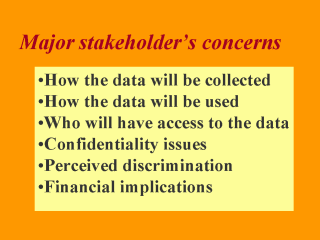| front |1 |2 |3 |4 |5 |6 |7 |8 |9 |10 |11 |12 |13 |14 |15 |16 |17 |18 |19 |20 |21 |22 |23 |24 |25 |26 |review |
 |
To guarantee
relevance and develop a sense of ownership, Ensure the major players are consulted, that
is, community leaders, community health workers, and a sample of patients. Ensure the indigenous health staff know what they want to collect (I mean every data item), how they are prepared to collect it, and who will be in charge of the data set. Their main concerns are often How the data will be used, who will have access to it, how the information will be stored, handled and reported. Remember that some health conditions may be too sensitive to be released to other parties. For example, if indigenous communities have a higher prevalence of sexually transmitted infections, they may not want the rest of the country to stigmatise them, and individual patients may be concerned about being identified and discriminated against. Also discuss sustainability and financial implications of a very ambitious information system. Keep it simple and useful for subsequent public health action. |